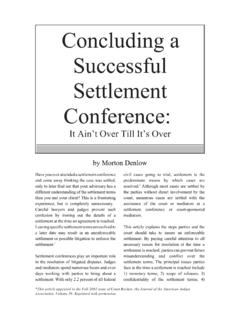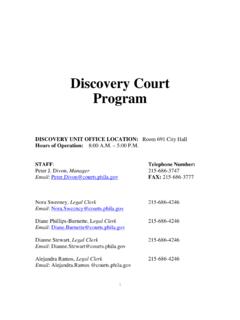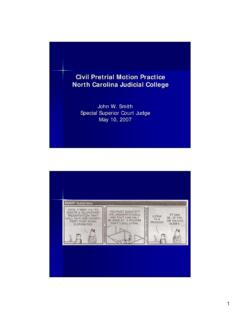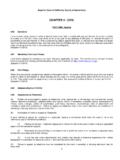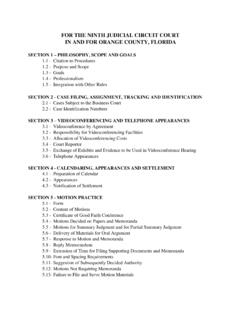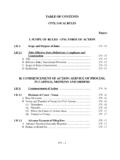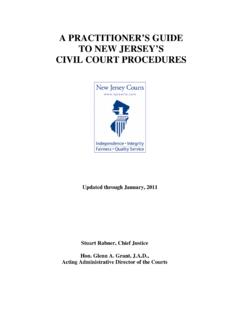Transcription of Winning in Arbitration: The 10 Golden Rules - JAMS ADR
1 This article originally appeared in the Summer 2017 issue ofBy Hon. Curtis E. von Kann (Ret.) Even the best advocate can t win an un-winnable case. But for the many cases that could go either way, the quality of advocacy is often the decisive factor. Having conducted arbitrations for 22 years and observed both very good and very bad advocates, I have concluded that those who observe the following Rules generally win their 1: Never Impair Your Credibility with the ArbitratorIn arbitration, relaxed evidentiary Rules , less formal proceedings and sophisti-cated decisions-makers mean that coun-sel s representations are relied on more heavily by arbitrators than by judges or juries. If your arbitrator believes that you have misstated the holding of a case, or what a witness said on deposition, or the content of a material document, he or she will likely conclude that you don t know your case or you are intentionally seeking to deceive.
2 Either conclusion delivers a body blow to your credibili-ty. Never say anything to an arbitrator unless you are absolutely sure it is cor-rect. If you don t know the answer to a question, don t guess; simply say, I don t know the answer but will get it for you promptly. Acknowledging that you don t know everything is credibility-enhancing (provided it does not happen frequently), as is acknowledging some of your oppo-nent s (non-critical) 2: Neither a CastigatorNor a Whiner BeMany arbitrators participate in the pro-cess because they are sick and tired of lawyers calling one another names, fuss-ing over discovery and screaming that the other side s position is outrageous, dishonest, in bad faith, etc.
3 They have come to arbitration because they want to work with grown-up lawyers who can zealously advocate for their clients and still deal courteously and coopera-tively with opposing counsel. Try very hard to develop a good working relation with that counsel. If the other side starts throwing mud, do not reciprocate. Arbi-trators like attorneys who get straight to the merits without berating the other side or whining about how badly they have been treated. Taking the high road in arbitration will put you way ahead of those who don 3: Throw Far-Fetched Claims and DefensesUnder the BusAnother threat to your credibility is the kitchen sink arbitration demand or re-sponse, which includes numerous claims or defenses that have little chance of succeeding.
4 Experienced arbitrators will recognize these as make-weight dis-tractions that should never have been pleaded. Their inclusion will signal that you haven t yet decided what your cli-ent s strongest position is and that you are hoping some scattershot missile will strike some target. Arbitrators do not suf-fer such diversionary tactics gladly. They want to know right away what the case is really about and what law and evidence each side relies on to support its 4: Don t Waste Timeand Money on MotionsMany inexperienced advocates file the same motions in arbitration as in litiga-tion: motions to dismiss for failure to state a claim, for a more definite statement, to compel discovery, for sanctions , in limi-ne, for summary judgment ( summary disposition in arbitration), etc.
5 Almost always, this is a huge waste of time and money. Most arbitrators prefer to deal with procedural issues via conference calls rather than having lawyers hurl lengthy missives back and forth. They are also keenly aware that, in arbitration, there is no appellate body to reverse an improperly granted motion and that one of the few grounds for vacating awards, under both the Federal Arbitration Act and most state arbitration statutes, is refusing to hear a party s evidence. You will save your client money and prove your arbitration expertise if you file no motions and get ready for the hearing as quickly as in Arbitration: The 10 Golden RulesThis article originally appeared in the Summer 2017 issue ofRule 5: Keep Your Opening Statement Short but MemorableIf you have laid out your case in a pre-hearing brief, the arbitrator has al-most certainly read it and won t appreci-ate an oral repetition.
6 Even if there were no pre-hearing briefs, keep your open-ing short, providing an executive sum-mary of your case in chronological order without getting into the weeds. Try to sum up some key points in phraseology the arbitrator will remember. If you have compelling evidence, mention it. If your opponent has some evidence that hurts you but is not fatal, take the sting out by mentioning it and citing other evidence that puts it in the least harmful light. Don t overstate your case (that will come back to haunt you), but outline it in a clear, concise and straightforward way. Don t argue; that comes after the 6: Forget theAdmissibility of Evidence;Focus on Its Weight InsteadA nearly infallible marker of a neophyte arbitration advocate is seeking to ex-clude hearsay, or a lay opinion or a busi-ness record for which a complete shop-book rule foundation has not been laid.
7 The Rules of evidence are hardly ever applied in arbitration (except as to priv-ilege and settlement offers). Thus, near-ly all the evidence that any party wishes to present will be received for what it s worth, so fighting over admissibility is a fool s , many advocates fail to appre-ciate the importance of those quoted four words. Evidence that Joe said X about Y will be received. But why should the arbitrator care? Is there any evidence concerning Joe s honesty; what back-ground, education or experience he had to make his observations reliable; any bias or particular perspective he had on the matter at issue; his memory; or his ability to accurately record what he saw and heard? Similarly, a purported business record whose authenticity is not disputed will be received but given little weight un-less the proponent demonstrates that the person who made the entry had suf-ficient knowledge and incentive to make it reliable, that the recording was close in time to the event and that the business document maintenance practices pro-vide reasonable assurance that the entry has not been tampered short, get in the evidence contest that matters in arbitration.
8 It s not about ad-missibility; it s about weight. Rule 7: Do Not Ask Leading Questions During Direct ExaminationsArbitrators are unmoved by direct ex-aminations that consist of your witness agreeing to your account of events. Conducting a direct examination with-out leading questions is hard work. It requires careful planning on your part, thorough preparation of your witness and several dry runs. But if your witness is able to tell a coherent story, clearly and concisely, in his or her own words, that direct examination will have a much greater impact on the arbitrator than any leading you could 8: In Cross-Examination: Less Is MoreIneffective advocates believe that they must address on cross-examination ev-erything an opposing witness said.
9 This is a big mistake. It gives the witness the opportunity to repeat the many parts of direct testimony that you cannot dis-prove merely by questioning him or her. A far more effective cross-examination is one in which you inquire about a few statements made on direct and force the witness to acknowledge that the state-ment was incorrect or, better yet, untrue. Usually, that is best done by confronting the witness with a clearly inconsistent statement he or she made in a depo-sition or document. Your first question should be about testimony on which you have the strongest impeachment. Once you have secured from the witness four or five admissions of error, say, I have no further questions for this witness, and sit 9: In Briefs: No Bull,No Miscitations, No TyposAll your briefs should be brief, clear and cogent.
10 Make your arguments flow per-suasively from the relevant facts and law. Do not overstate your case, harangue the other side or engage in rhetori-cal flourishes. Scrupulously check and double-check all evidence and legal ci-tations to assure that they are exactly correct. And proof your briefs carefully; typos, misspellings and similar errors connote sloppy work and signal that you were unwilling to take the time required to provide the arbitrator with a first-class product he or she could rely on. Rule 10: Give the Arbitratorthe Tools Needed to Writethe Award You WantBy the time of closing arguments, most arbitrators are reeling from information advocates compound the problem by spewing forth rapidly (because they are rushing to squeeze into their allot-ted time every point that has occurred to them) detailed factual accounts, dates, names, damages calculations, primary and alternative legal theories, testimony quotes, exhibits numbers, case citations, etc.
